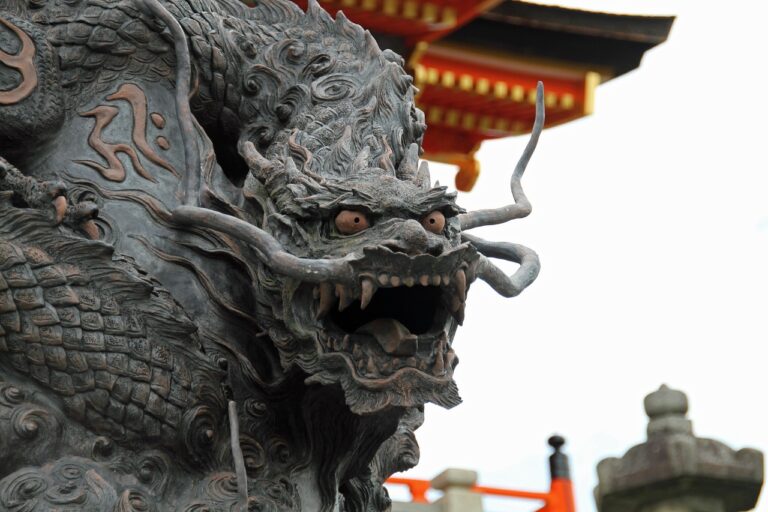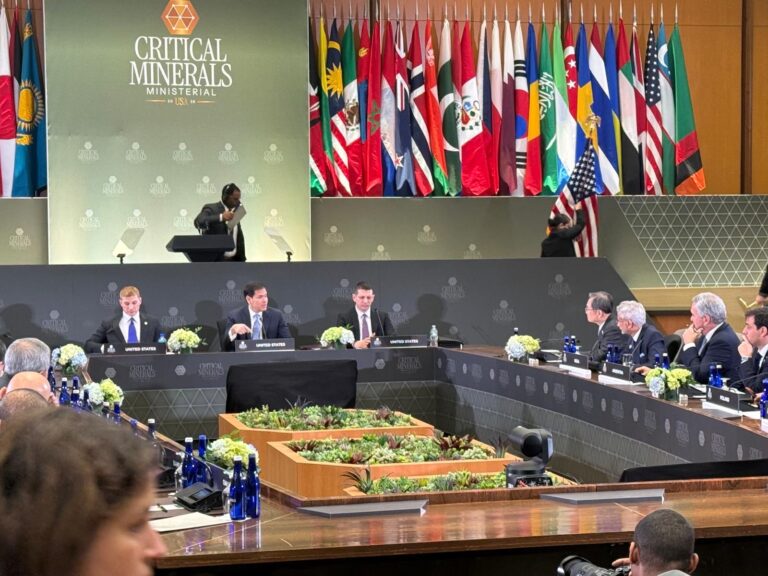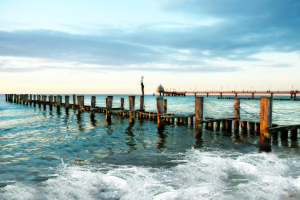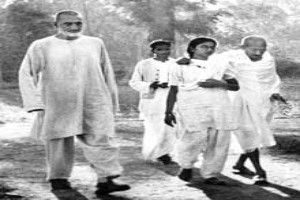
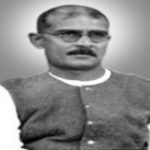 By Mahadev Desai*
By Mahadev Desai*
(This report was published in Harijan on May 7,1938)
Takht-i-Bahi
The Khan Saheb was good enough to take me for a little sight-seeing too. Close to the boundary of Mardan is a hill studded with Buddhist ruins. The ascent is a few hundred feet and quite easy, and the ruins are protected under the Protected Monuments Act. But alas there is little there now which remains to be protected. Buildings there are mostly in ruins, but the walls made up of thin square and oblong sheets of stone are still intact making us wonder how they have held together all these centuries. There is very little of the hill that is without these remains, and it is quite likely that in some remote time it must have been a most populous centre of civilisation, and maybe also of learning. In a room are collected all the figures that have survived the cupidity of the old British curio-hunters, but there again one heaves a deep sigh to see that all of them, without an exception, are broken or disfigured. Some of them must have been fine images of Buddha. The delicate carving of the parapets is still to be seen. The whole place gives one the impression of substantial mansions with vast meeting halls or prayer places and makes one sigh for the days that are no more.
Also read: History Recalled: In the Frontier Province – 1
The old pathan in charge of the ruins took us down an underground cellar and said: ‘This is a dungeon where prisoners used to be kept.’ ‘He is talking nonsense,’ said the Khan Saheb, ‘I am sure this was no dungeon. It is quite likely that hermits prayed here in the summer and in extreme winter, and the whole place gives me the impression of a house of God than anything else.’ It did one’s soul good to see the Khan Saheb regard with respect and admiration the relics of a faith which is not his. ‘Is it not in the fitness of things, Khan Saheb,’ I said, ‘ that you should preach the gospel of ahimsa where centuries ago the same gospel was preached by Buddhist monks and pilgrims?’ Khan Saheb smiled in appreciation.
The Khyber Pass
The other place Khan Saheb took me to was the Khyber Pass about which one has heard so many legends that one feels one must visit it if one should happen to go to the Frontier. As our car winded its way along the narrow road that passes between two mountain ranges, the Khan Saheb began to think aloud. Money has been poured like water over this military road and the military outposts and forts on the road right down to the Afghan Frontier. Here and there on the sides of the hills are memorial tablets to soldiers killed in fighting the Afridis. Khan Saheb sees all this and says: ‘Is it not a tragedy that we should not have been able to guard this narrow pass against the foreign invader? How woefully disunited and cowardly must we have been ? To my mind the problem of defence of the Frontier appears to be pre eminently simple, if we were united.’
‘And why these fights with the tribes?’ he asked, as he showed me the tribal villages – or rather clan-strongholds- closed in with mud walls on either side of the road. Far away in the distance on high tops of hills stood men with rifles but dressed like the Afridis. ‘These are Khasedars,” he said, ‘drawn from the tribes, and they are paid something to guard the road. These Afridis are plain simple fellows like the Pathans, hospitable to a fault. They speak pushto, and apart from their blood-feuds they are well organised and close-knit. Why should it be difficult to make up with them? Why should they be bribed, and bombed when they cannot be bribed into submission?’ I am here paraphrasing Khan Saheb’s Urdu, but there was an unexpressed agony behind it all which no words can convey. ‘They want to make friends with us, and if we could solve the problem of their roti, they would live peacefully and amicably. But we are not allowed to go near them,’
‘Look at the way they live,’ he said, as he pointed to small hollows in distant rocks. ‘They are their caves, they have no other dwellings, and you can imagine what they would get to eat. And yet they are brave and long-lived. I tell you I do not understand all your talk of vitamins and vitamin-deficiency. Find me a people whose food is more deficient of vitamins than these ‘half-starved Afridis, and they are stronger and braver than most of the people who suffer from no vitamin-deficiency.’ I smiled incredulously. But the Khan Saheb went on: ‘No, they are strong because they are pure and not civilisation-spoilt. Adultery is non-existent, for the penalty is death.’
‘And what are those white flags flying over their habitations?’ I asked. Well if the British have their memorial tablets, the Afridis have their martyr flags. ‘They are memorials of those who have died innocent deaths or died fighting with the British,’ explained the Khan Saheb. It is with these people that incessant wars are waged, and bombing is the latest weapon being used to subdue them. How futile it is was clearly shown by General Sir George MacMunn in his Romance of the Indian Frontiers :
“One of the disappointments of modern times is the uselessness of the Air Force in handling the problem. It was hoped that solution might have been found. But it was soon realised that bombing has no material effect against tribal skirmishers and sharpshooters. Even machine-gunning hits no one amid rock and crag. The Air Force pilots on the North West Frontier have been the admiration of the world in their rescue of the Europeans in Kabul during usurpation. They fly most daringly into the mountain. They do, it is true, bring notice of tribal gatherings, they can poke their noses up tribal valleys, and they can overlook, to the huge annoyance of the clans, but that unfortunately is almost all. In the late Peshawar troubles the results of their activities, in themselves beyond praise, was in the nature of things trivial. Even punitive bombing has now been realized as of little avail. To bomb unwarned; means destruction of families. To bomb after warning is absurd. Dispersal is the matter of moments, and half the year the tribes live in caves. “
This, of course, apart from the moral aspect of the case which military men need not consider!
Peshawar
I was in a hurry to be back and could not go to Kohat and see the Kohat Pass and the Rifle Factory in the independent territory. Even Peshawar I had very little time to see. But two spots I was taken to have stuck in my memory.
The Sikh friends invited me to see their Gurudwara which is a unique one. Two to three hundred people are fed free every morning and evening at the Gurudwara langar, and I am told numerous students take advantage of this free feeding. There is no restriction of caste and creed and no one is turned away. ‘But how do you manage this?’ I asked. ‘Are not you raided by the hungry and the needy of whom there is no dearth in our country ?’ ‘No’, said the friend in charge. ‘The Lord provides and the Lord feeds, which in other words means that people give and people feed. In fact we have found that the more the feeders the more are our receipts from people.’ It runs schools and hostels, gives scholarships to students, and renders such other social help. The Gurudwara is situated in the most thickly peopled locality, but the place is very well kept.
Quite an unhappy contrast was afforded by a place called ‘Panch Tirth‘ meaning five sacred’ places, associated with the name of the five Pandavas. These are natural perennial springs full of refreshingly cool water in summer which becomes hot boiling water in winter. They are very much used by devout Hindus, and yet the place is so ill kept that it is a shame to those in charge of it. There are several such springs in the vicinity. Some of them are under Sikh management and they are better kept. Apart from our duty as Hindus to keep places held as sacred scrupulously clean, plain sanitation and cleanliness demands that these places should be made real centres of attraction for all who should like to use the springs for bathing.
– Concluded
*Mahadev Desai was an eminent freedom fighter and Mahatma Gandhi’s personal secretary; article courtesy his grandson, Nachiketa Desai.


